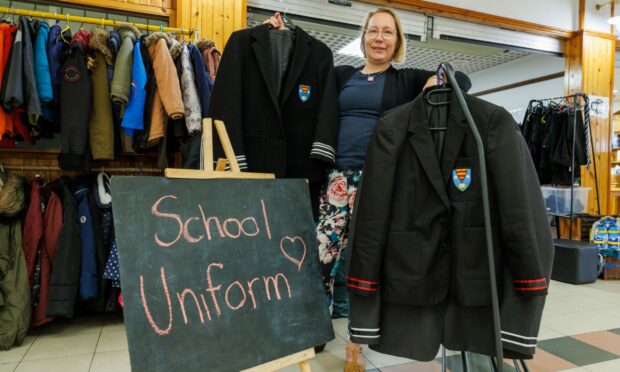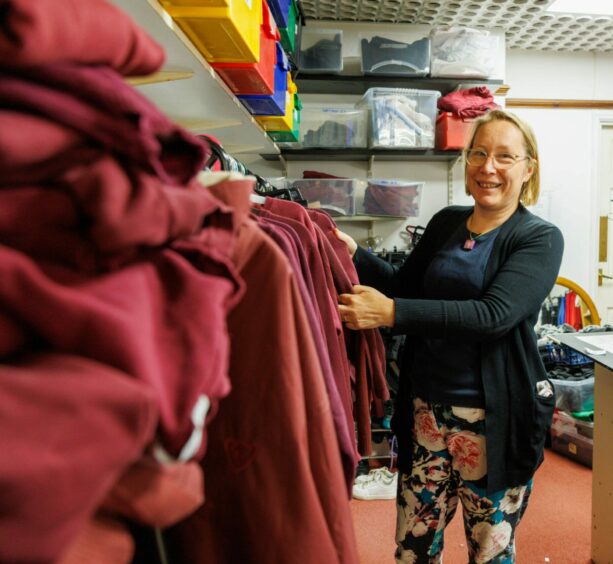This Crieff mum says you should avoid the back to school marketing: both to save money and reduce waste.
Elizabeth Philip started a uniform bank with her friend, Caroline Murphy, in 2020.
She argues that back to school offers encourage unnecessary waste and can even impact children’s wellbeing.
Her second-hand offering is vital to parents who can’t afford to buy new school clothes every year – and those who want to reduce waste.
“We started it because we were finding that our kids were going through clothes really quickly,” Elizabeth said.
“They were coming home with a hole in a pair of trousers that had cost you £10-15, or not wearing things that you bought them because it wasn’t their style, or it wasn’t comfortable.
“We really just felt like it was important to reuse.”
Back to school shopping sustainably is ‘in vogue’
Elizabeth said she was already distributing hand-me-downs among her friends and family to reduce waste and keep costs down.
“But then,” she explained, “we decided to make it wider, and invited other people to join in.
“Sustainable fashion is a fashionable thing nowadays. It’s ‘in vogue’.
“People are thinking about the environment because clothes have one of the biggest impacts.”
Fast fashion has a harmful impact on the environment, contributing to waste water and carbon emissions.
Promotions in some stores can also encourage overconsumption, says Elizabeth.
“Sometimes there are promotions for getting seven shirts and umpteen pairs of trousers,” she said.
“Is that actually what the child needs, or does it encourage the parent to buy more than actually is required?
“I know being a parent myself I’ve had those moments where I don’t have a washed shirt to put the child to school in the next day, but generally speaking if we look after their clothes and if we wash them properly, then they should last us a good length of time.”
At their Crieff uniform bank, parents can get their hands on cheaper clothes too.
“To be able to hand clothes down to families in the community is really important,” Elizabeth said.
“Today, I had a family with five children come in, and the mum bought a whole load of uniforms, something for everyone.
“She spent £25, rather than going elsewhere, where she could have spent hundreds of pounds trying to clothe her kids for going to school.
“It’s about making sure that people can afford to put kids to school in their uniform which really important.”
Back to school campaigns cause harmful peer pressure
The ‘back to school’ marketing campaigns are also detrimental to kid’s welfare, Elizabeth argues.
“I think it’s a shame because kids feel like they have to join in.
“There’s peer pressure for them around having a new bag, having a new pencil case, having everything new every year.
“And there’s also pressure for parents to have their kids turn up with new stuff.”
But Elizabeth said she’s delighted to see that their thrifty offering is taking off.
“We’re finding that more people are looking at the different sides of things and trying to find out how to reuse and recycle.
“We had a family in that went away with a set of three school bags. Uniform for each child and a school bag.
“It was brilliant, and the kids were there too.
“I think if you encourage your kids to take part in that to see the sustainable side, to see the recycling and talk to them about why you’re doing that way, that it’s for the environment, that’s the way to go about it.”
Elizabeth continued: “My kids have been brought up with hand-me-downs and we always look in the charity shop before we look elsewhere.
“I think that mindset is becoming more prevalent which is good, I’m really glad to see that.
“When you look into the environmental impacts of clothes on the world, you really have to stop and think about it.”
Instead of splurging on a new set of back to school uniforms and schoolbags, Elizabeth advises taking a moment to think.
“Have a think about what you’re doing. Take stock of what you have in the house first.
“Ask around if friends or family might have something you can use as a hand-me-down.
“Look and see if your school or community has a uniform bank, because in the end it’s going to help the environment and save you money.”













Conversation